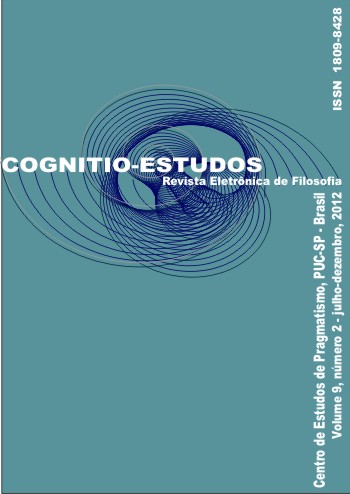Some considerations on the concept of logic in Dewey's theory of inquiry and in Carnap's works on induction
Palavras-chave:
Rudolf Carnap, John Dewey, Philosophy of Logic, Pragmatism.Resumo
This paper aims to discuss some features of the concept of logic which can be found in John Dewey’s book Logic: The Theory of Inquiry in comparison with the concept of logic that underlies Rudolf Carnap’s semantical constructions, especially in the book Logical Foundations of Probability. John Dewey proposes in his book that logical forms – understood as the relation between arguments – arise within contexts of inquiry and are concerned with controlling inquiry. This is supposed to overcome the duality between logic and methodology of science, since logical constructions are to be derived from the process of scientific inquiry. This approach would also have the advantage of avoiding problems related to the foundations of logic, which frequently involve metaphysical positions and controversies. Carnap, on the other hand, adopts a method of abstraction for his constructions, that is, he seeks to develop a pure logic, avoiding getting into methodological problems. Dewey’s position apparently fails to account for the problem of psychologism and the matter of applications of logic, especially when considered in relation to the points of view presented in his later book Knowing and the Known, written with Arthur Bentley. This paper is going to discuss those two problems from Carnap’s point of view in order to reassess Dewey’s stance on that matter. Thus, we will see two conceptions of logic which apparently are opposed to each other, but it is intended to show that we are dealing with two different approaches with different scopes, and consequently they can and should be brought together in order to clarify epistemological problems.Métricas
Referências
CARNAP, Rudolf. [1950] (1962). Logical Foundations of Probability. 2nd Edition. Chicago: The University of Chicago Press.
______. [1950] (1996). “Testability and Meaning”. 2nd Edition. IN: SARKAR, 1996.
______. [1953] (1956). “Empiricism, Semantics and Ontology”. IN: Meaning and Necessity. 2nd Edition. Chicago: University of Chicago Press.
CARUS, André W. (2007). “Carnap’s Intellectual Development”. IN: FRIEDMAN; CREATH, 2007.
CHURCH, Alonzo. (1945). “Review”. IN: The Journal of Symbolic Logic, volume 10, nº 4.
COFFA, Alberto. (1991). The Semantic Tradition from Kant to Carnap: to the Vienna Station. Cambridge: Cambridge University Press.
CUNHA, Ivan Ferreira. (2009). “Charles Morris e o Pragmatismo de Rudolf Carnap”. Cognitio-Estudos: Revista Eletrônica de Filosofia. PUC – São Paulo, v. 6, n. 1, jan-jun/2009, pp. 015-020. URL: http://revistas.pucsp.br/index.php/cognitio/article/viewFile/5797/4110
______. (2010). “Values and Logical Tolerance: John Dewey and Rudolf Carnap”. Cognitio-Estudos: Revista Eletrônica de Filosofia. PUC – São Paulo, v. 7, n. 1, jan-jun/2010, pp. 009-018. URL: http://revistas.pucsp.br/index.php/cognitio/article/viewFile/2893/1877
______. (2012). “John Dewey and the Logical Empiricist Unity of Science”. Cognitio – Revista de Filosofia. PUC – São Paulo, v. 13, n. 2, forthcoming.
DEWEY, John. [1925] (2008). Experience and Nature. The Later Works of John Dewey, volume 1. Carbondale: Southern Illinois University Press.
_______. [1938] (2008). Logic: The Theory of Inquiry. The Later Works of John Dewey, volume 12. Carbondale: Southern Illinois University Press.
______. (1999). The Correspondence of John Dewey, 1871-1952 (I-III). Electronic Edition. Charlottesville, Virginia: InteLex Past Masters.
DEWEY, John; BENTLEY, Arthur F. [1949] (2008). Knowing and the Known. The Later Works of John Dewey, volume 16. Carbondale: Southern Illinois University Press.
FRIEDMAN, Michael; CREATH, Richard (org). (2007). The Cambridge Companion to Carnap. Cambridge: Cambridge University Press.
NAGEL, Ernest. [1986] (2008). “Introduction”. IN: Dewey, [1938] 2008, pp. ix-xxvii.
PEIRCE, Charles Sanders. (2010). Writings of Charles S. Peirce – A Chronological Edition. Volume 8: 1890-1892. Peirce Edition Project. Bloomington and Indianapolis: Indiana University Press.
RICHARDSON, Alan. (2007). “Carnapian Pragmatism”. IN: FRIEDMAN; CREATH, 2007.
SARKAR, Sahotra (org). (1996). Logical Empiricism at its Peak. New York and London: Garland.

